Gold and silver and bronze and on.
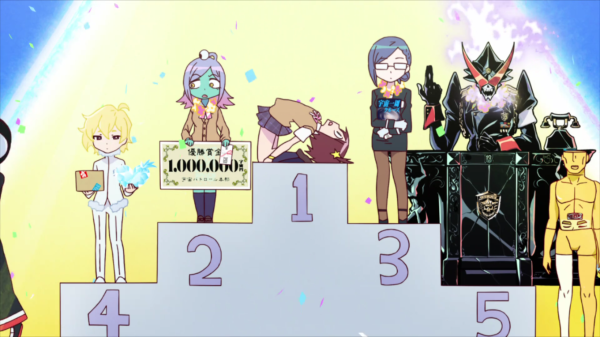
Spring might have been lacking the standout masterpiece and shoujo gem that Winter had (Shouwa Genroku and Snow White, respectively), but it more than made up for it in sheer quantity, offering up a variety of lively, stylish, and just downright fun series. In that respect, this season feels a little like last summer: I’m not sure how many of these shows are gonna make my 2016 Top 10 list, but I enjoyed watching just about all of them.
In other news, I think this is the last time you’ll see my Totally Arbitrary Rankings used in a season retrospective. More and more I’m realizing I don’t love the ranking system–it forces me to list shows one after the other even if I think multiple shows may have all been equally worthwhile for very different reasons. It’s reductive and misleading but, more to the point, not that fun. So enjoy the numbers for today, bid them a fond (or not) farewell, and look forward to a new format from here on out.
For now, though…
The Rankings
Unless otherwise noted, you can find out where these shows are streaming by clicking here and searching for the English title.
1. Tanaka-kun is Always Listless (Tanaka-kun wa Itsumo Kedaruge)
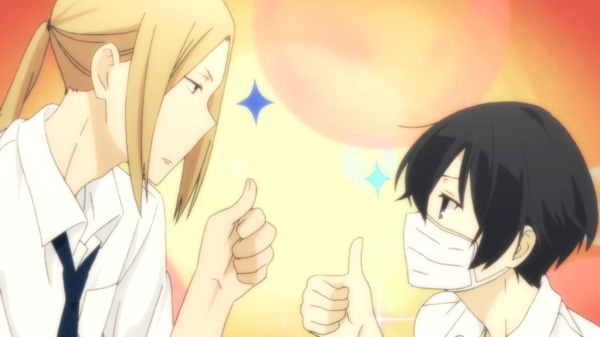
Episode Count: 12
In a sentence: Perpetually sleepy Tanaka, his best friend Ohta, and their classmates navigate the day-to-day absurdities of high school in this offbeat YA comedy.
Content Warning: One of the characters has a slightly creepy crush on her brother; possible queerbaiting
I love this show. I’ll have to give it some time to age, but there’s a good chance it’ll end up as one of my Top 5 all-time favorite anime comedies. It’s tone is so confidently, completely its own, using its deadpan protagonist and pointed silences to build humor like a snowball rolling down a hill, quietly layering joke upon joke, rarely calling attention to any of them, until suddenly I find myself caught up in a steady stream of giggles.
The central cast of high schoolers are all tremendously likable, with relationships that refuse to conform to your typical anime friendships, and the show’s general acceptance of others and warm, quiet wisdom about adolescence helps put some real meat on those funny bones. While it has some potential issues with queerbaiting (it’s adapted from an ongoing manga, so it’s hard to say for sure) and sometimes stumbles with its gender commentary, overall Tanaka-kun was a start-to-finish delight, exactly my brand of kindhearted silliness. Here’s hoping the manga gets a U.S. release soon.
By the by, I’m working on some Tanaka-kun mini-essays right now. Currently I have this one and this one, but you can check back later for more, too.
Grade: A-
2. Concrete Revolutio: The Last Song
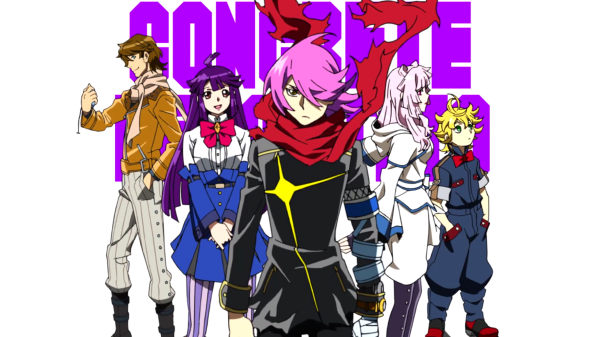
Season Episode Count: 12
Series Episode Count: 24
In a Sentence: In a world packed with magical girls, aliens, giant monsters, and other super-powered forces, one organization works to watch over the watchmen.
Content Warning: Violence (against adults/kids); mild nudity/fanservice
ConRevo probably deserves that #1 spot for sheer ambition if nothing else, but its inability to get me to connect with its central cast (and its disappointingly flat female co-star) once again knocks it down to an admiring but emotionally distant second place. The show attempts to tackle a generation of Japanese history as well as the major themes surrounding superheroes–justice, freedom, peace–in a brief 24 episodes. Impressively, it often succeeds, and even when it doesn’t it leaves its audience with something to chew on.
The series uses superhumans as a kind of umbrella metaphor for all manner of topics, be it social marginalization, environmental destruction, western modernization, or global weaponization. Sometimes this catch-all tactic works and sometimes it muddies the overall intent, but in general it leads to thoughtful discussions that allow for shades of gray while still fighting for the show’s own vision of morality/justice. It’s dense enough that I’ll need to watch it again before I can settle on a proper interpretation–which, character issues aside, is usually a good sign that a show has a lot going for it.
Series Grade: B+
3. My Hero Academia (Boku no Hero Academia)
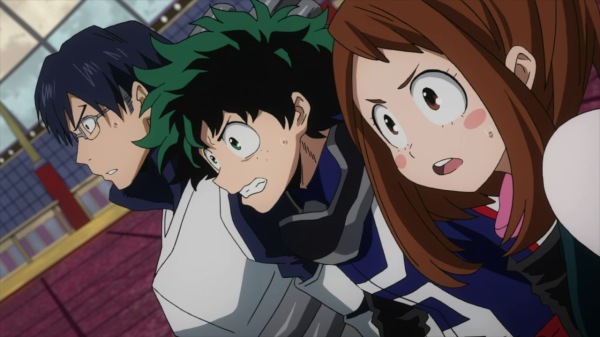
Episode Count: 12 (Season 2 confirmed, but no release date yet)
In a sentence: Deku is a regular human in a world where almost everyone has developed some kind of supernatural power (called “quirks”), but he’s still determined to become a Hero–and with a little help and support from an unlikely source, he just might manage it.
Content Warning: Violence (against adults/teens); mild fanservice (and an annoying kid who calls attention to it)
My Hero Academia sometimes suffers from the drawn-out storytelling and rationed animation common in long-running shounen adaptations, as well as the occasional bits of obligatory (albeit tongue-in-cheek) fanservice. And now that the negatives are out of the way–MHA is so great, you guys! It draws on a combination of shounen manga and western superhero traditions to create an earnest, entertaining, subtly sophisticated, and fiercely optimistic tale of underdogs, entitlement, the importance of having someone who believes in you, and how anyone who chooses to do good is already a hero.
The characters are (mostly) wonderful, with personalities built atop familiar archetypes that avoid lazy stereotyping. It’s funny in its lighter moments, dynamically animated when it matters, and uses its cast’s relationships to keep you invested during the more serious arcs. Deku is the kind of protagonist you want to root for and protect all at once, and his mentor is the supportive father-figure you wish more shounen MCs had. I always looked forward to new episodes and am eager to find out what happens next. There’s a Season 2 on the way–but my library has copies of the manga, and I may not be able to wait that long…
Season Grade: B+
4. flying witch
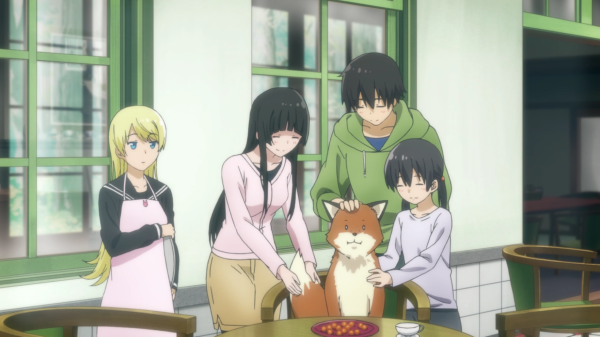
Episode Count: 12
In a sentence: A down-to-earth, fantastical slice-of-life about a witch who goes to live in a small town with her cousins while she attends high school.
You shouldn’t try to marathon flying witch. It’s the anime equivalent of a lazy Saturday afternoon: utterly pleasant, slightly sleepy, and somehow both magical and mundane all at once. It fits squarely in the iyashikei (healing/soothing) genre without veering into the cloyingly sweet or infantile (as many shows like it tend to do), and might be the best-executed series of the season in terms of what it’s trying to do (make you feel calm and happy) and how well it accomplishes it.
Whether they’re planting mandrakes, baking shape-shifting sweets, or going sky whale-watching, our cast of friendly, flawed, independent witches and their human (and otherworldly) friends navigate their day-to-day lives in a way that makes magic seem like a natural part of the world, which in turn suggests that the world is full of its own kind of magic. If flying witch is about anything (besides relaxing its audience), maybe it’s that: To remind us to see the world and all its strangeness with fresh eyes, and to enjoy the quiet magic present in our own lives.
Series Grade: B+
5. The Lost Village (Mayoiga)
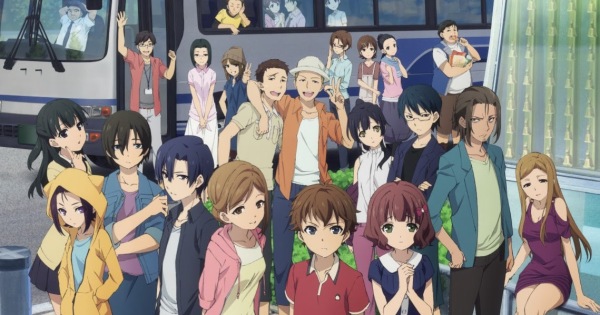
Episode Count: 12
In a sentence: A busload of people looking for a “new start” take a trip into the mountains to a(n urban) legendary hidden village… because what could possibly go wrong with that plan?
Content Warning: Violence (against adults/kids); depictions of trauma and child abuse
Set up to look like a horror series, The Lost Village gleefully refuses to actually be a horror series, using intentional anticlimax, deliberately poor shot selection, and matter-of-fact absurdity to undercut itself at every turn. Characters are one-note parodies, conversations derail into pointless arguments, and almost every potentially dramatic moment is either interlaced with or swiftly followed by something so silly it stomps all the tension out of the scene, more likely to elicit laughs than gasps.
Which isn’t to say Lost Village is a nonsensical or vapid mess. It contains a central, recurring theme about trauma and awareness (of oneself and others), a coherent narrative, and complete character arcs. It’s just that it waggles its eyebrows at you at (almost) every turn, daring you to take any of it seriously. And that’s because Lost Village isn’t horror: It’s a dark comedy with a point, and one that never lets its cast in on the joke. Whether that kind of straight-faced, sideways, “intentionally bad” (unintentionally good?) humor will work for you is totally up in the air. Me, though? I thought it was kind of brilliant.
Season Grade: Art is subjective and grades are a farce. The concept of quality is a bedtime story we tell ourselves to give our opinions meaning. So, B+, I guess?
6. Bungo Stray Dogs
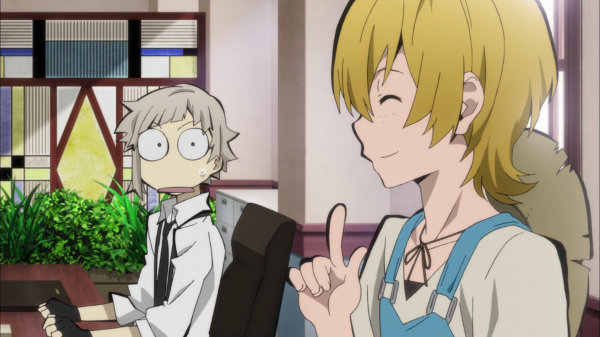
Episode Count: 12 (Part 2 airs in the fall)
In a sentence: An organization of people with supernatural powers (all named after Japanese literary figures) investigates and keeps the paranormal peace.
Content Warning: Violence (against adults/kids); mild fanservice; implied incest; gallows humor (e.g., a running joke about one of the characters wanting to commit suicide)
I’ve always been pretty adamant that anime is a medium, not a genre, and it can tell the same wide variety of stories that any other medium can. But if you wanna know what drew me to anime in the first place, it’s because it’s one of the few mediums where you can find stories that look like Bungo Stray Dogs: A premise that sounds like fanfic (“famous authors but as pretty boys and girls WITH SUPERPOWERS!”); a messy but sincere, character-driven story and fantastical world that spool out slowly before you; a cast of endearingly messed-up goofballs; and an even balance of stylized action, (melo)drama, and, of course, broad humor and silly faces.
Exaggerated, big-hearted, energetic–Bungo is all of these things, along with some well-trod themes about found families and redemption, and maybe it isn’t much more than that. But (like with most Igarashi-helmed projects), it builds on itself well, so that I’m now genuinely invested in the characters and story and wanting to hear more. Plus its growing cast of literary superhumans makes this bookworm blogger downright giddy. Maybe Bungo is little more than its opening theme’s title (“Trash Candy”). But I sure am happy I get to watch more of it.
Season Grade: B
7. Kiznaiver
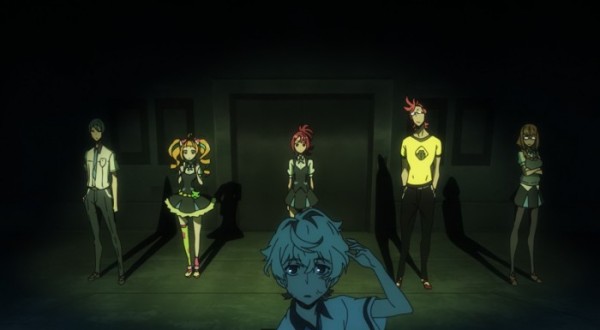
Episode Count: 12
In a sentence: Seven students are kidnapped and forced to take part in an experiment that enables them to experience and share one another’s pain.
Content Warning: Violence (against adults/kids); trauma/abuse; Tragic Lesbians™
It seems like every season there’s a show whose existence I staunchly defend even if I have a ton of issues with it. And lo, Kiznaiver. It might be the best show of the season in terms of using its art to create atmosphere, and it has noble intentions and ambitious goals, trying to tell a story about what it means to form emotional ties with others. (The title is a play on kizu, meaning “wound,” and kizuna, meaning “bond,” a connection that forms the thematic backbone of the series.) In many ways I think its central story is a success, and at times it can be incredibly affecting and visceral in its depiction of love, grief, and healing.
…But then it crams in a poorly developed and totally unnecessary love pentagon. Or it [spoilers] inserts a Tragic Lesbian Backstory that might have actually worked if it hadn’t led to Tragic Girl Finding Herself A Man (edit: and yes, bisexual people do exist, but there’s too long a history of anime and manga treating girl/girl high school romances as a “phase” for me to see it as such). [/end spoilers] Or it loses sight of some of its larger questions and criticisms in favor of lengthy exposition, out-of-place humor, or repetitive dramatics. So is Kiznaiver worth it for the highs even if it comes with the lows? Well, I’m glad I watched it, and I’m excited to see more work from the show’s staff. But if those cons sound like deal-breakers for you, then it might be best to give this one a pass.
Series Grade: B-
8. Sailor Moon Crystal: Season III
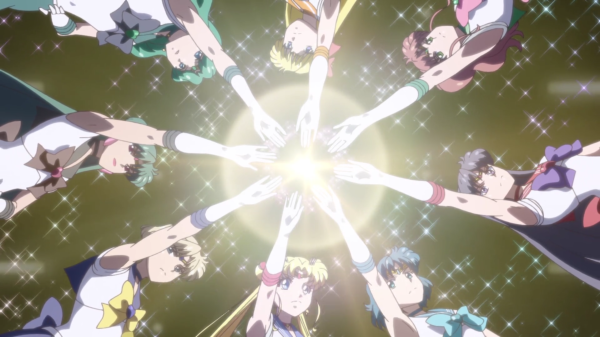
Season Episode Count: 13
Series Episode Count: 39
In a Sentence: Fighting evil by moonlight, winning love by daylight…
Content Warning: Magical violence; mild nudity
I’ll let my standalone post about how Sailor Moon Crystal won me back do most of the talking. Suffice to say the show still has its weak spots (rapid pacing, stilted animation, flat antagonists) but has finally recaptured what gives Sailor Moon its charm. A good sense of humor, affection for the characters, occasionally gorgeous cinematography, and (most importantly) a real love of the source material has revived this uneven but fun adaptation. For the first time ever, I’m looking forward to seeing more.
Season Grade: B-
9. Kabaneri of the Iron Fortress
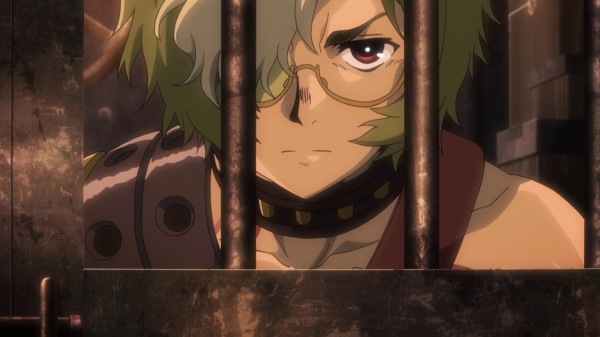
Streaming on: Amazon Prime
Episode Count: 12
In a sentence: When a horde of zombies (called kabane) attack their walled city, Ikoma and his band of ragtag survivors must take to the rails in order to survive.
Content Warning: Violence (against adults/kids); mild fanservice
All Kabaneri had to do was be a fun, action-packed show about a likable, makeshift community banding together to fight zombies on a train. And for about 7 episodes it was exactly that. And it was great! Then it decided to cut back on its thrilling zombie battles in favor of rushed, poorly explained political intrigue and family drama involving a cartoonishly extreme antagonist, cheap deaths, a lot of abducted ladies, and arbitrary machismo. The last few episodes basically discarded everything that made the main characters interesting, pigeonholing them into stereotypical roles and actions for the sake of a climax that never felt earned.
There’s some wildly entertaining stuff in the first half, which is why it has as high a grade as it does. But it really derailed (ba-dum tish) in the back end, which is why it’s also the most disappointing show for the season for me.
Series Grade: C-
Shorts
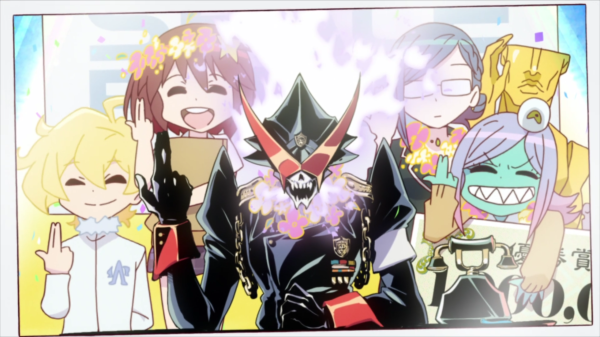
Space Patrol Luluco
When it wasn’t self-indulgently referencing other Studio Trigger shows, Luluco was a vibrant, wild, and sometimes brutally honest portrayal of adolescence and first loves. From awkwardly and unintentionally “transforming” in front of your classmates to having your crush be both kinda shallow and so important it feels like a matter of life and death, Luluco told its central story with sympathy, wit, and a ton of energy. It had its share of slumps and cracks, but taken as a whole it’s a surprisingly smart little series. Definitely worth the 90-odd minutes it’ll take to watch it.
Shonen Ashibe Go! Go! Goma-chan
This cute show about a baby seal and his owner would be great for your younger kids (assuming they can read subs and/or it ever gets dubbed). I dropped off around episode 10 because, charming as it was, there’s only so much kindergarten-level TV I can watch before I lose interest. But I think of it fondly, and that ending theme will be in my head for weeks.

Tanaka was my favourite too. Such a lovely gem of a show.
LikeLike
[SPOILERS for the Kiznaiver spoilers]
While being aware that Lesbian Finds Happiness Through the Right Man could rightly be one interpretation of Honoka’s arc, I think it was neither what the writing was going for, nor definitively what happened. It looked open-ended to me as to whether or not Honoka ever returned Yuta’s feelings romantically.
I think it helped that most of the feelings she voiced when the focus was on her were about friendship and the entire group, and her most important speech in the last episode was about how she’d realized they were all her friends. Even her final scene in the closing credits with Yuta, although it was definitely a shiptease, didn’t look like it was saying “canon couple” to me. I’ve been in the tumblr tag a lot (that’s how I found your post) and there are people there who saw it like you did, but there were also people who interpreted her as returning his feelings and thought it was cool because it meant Honoka was bisexual. (And being bi myself, I was happy to see people get that from it even though my interpretation was different.)
I just wanted to put that out there because if I hadn’t seen Kiznaiver yet and heard that it had a Tragic Lesbian Healed By Man subplot, I would consider that a dealbreaker and skip it. But I watched it weekly and still really enjoyed it, because I didn’t see the story that way, and I wouldn’t want people like me to take it off their list without getting another point of view on it.
LikeLike
[Kiznaiver Spoilers, etc.]
Fair enough. I thought that final scene all but screamed “Honoka returns his feelings and they are going to become a couple now,” and in an obnoxiously possessive/controlling way (“I’m going to change the way you look so no one else will like and you’ll have to be with me” is pretty effed up), to boot. Honestly I’m jealous I couldn’t interpret it in the open-ended, friendshippy way that you did. I’d have enjoyed the epilogue a lot more.
I wanted to see it as bi representation, I really did, but anime/manga has such a long history of depicting girl/girl high school relationships as a “phase” that everyone eventually grows out of, and the cultural context surrounding those stories tends to encourage a similar mindset, so I have a hard time believing that was what the show was going for. And I’m just. So. Exhausted by queer tragedy in all my entertainment mediums right now. I didn’t have the energy to give Kiznaiver the benefit of the doubt, especially since it was so damned determined to shove all of its characters into hetero romances (requited or otherwise) with each other. There was something almost aggressively hetero-normative in how it handled its relationships and especially female cast members, as if it’s impossible for a girl to spend time with guys and not develop romantic feelings for one of them.
…Sorry. You caught me on a tension headache day and I’m having a hard time discussing this without it coming out a lot more abrasive than I want it to. If I sound like I’m trying to fight, I’m not. I’m just trying to explain my reading in more detail. Your interpretation is valid. And I really did like a lot of things about Kiznaiver. It’s just that it also happened to punch a lot of my “this is lazy storytelling” buttons, so I came down harder on it because of that, I think.
LikeLike
I agree about the cultural context, and even wrote about it on my tumblr (http://come-soft-rains.tumblr.com/post/146483187017/about-honoka-being-bisexual) and I think a lot about when it is/isn’t appropriate to turn to “Death of the Author,” especially when the author comes from a place with different cultural norms. I still don’t really know what I think the answer is to that.
So I am very sure they weren’t *trying* to say Honoka is bi, but I’m also not completely sure they were trying to say she loves Yuta. About her “I want to make you fat” comment, I wasn’t even sure if that was supposed to be cute or to say, “see, she still has a long way to go in interacting normally with people without being offputting, but at least she’s trying?” I might be being generous because I was worried that Honoka/Yuta would be blatant, full-on love confession and kissing-level canon, so what happened was a relief to me in comparison to that. Or it might be knowing that bisexuality is so rare on TV, even in the US, that I’ve learned to be happy with even unintentional subtext for it. Or hell it might also be my own refusal to see my ship die (I personally shipped Nico/Honoka).
There’s also the fact that in Kill la Kill, also by Trigger (mild spoilers just in case?) in the last episode, the female main character’s female best friend asks her on a date (which she accepts), ignoring the guy who’s liked her for most of the series. Meanwhile the ending credits show that the guy is still trying to win the friend over, and the director’s comment on all this was something like “eh, interpret the relationships however you want.” So I thought there might be a similar comment about Kiznaiver’s ending at some point in the future. But then it’s same studio but different writer, so who knows.
And it’s fine, I do get your frustration and share it about a lot of other shows and parts of this one. I had some predictions about Kiznaiver pre-Love Arc that I would have preferred to what actually happened, too. I think I also feel the same way you said you do in your review, about staunchly defending the show despite having a ton of issues… like what I’m doing now. So what I mean is, I agree your interpretation is valid too. I just wanted to defend my own.
LikeLike
I hear you. “Death of the author” is one of those critical theories I have no real stance on; while I tend to prefer taking historical/cultural context into account because I’m personally interested in consuming fiction as a way to see how others view the world, as long as the writer makes it clear how they’re approaching the story (“Hey, I’m interpreting this from a personal/historical/etc. perspective,” kind of thing), I think any lens can offer a potentially enlightening analysis.
And, yeah, I definitely understand the difficulties with finding representation and sometimes just being happy with subtext. (I’m ace, myself.) It’s frustrating, for sure, but does seem to be getting better, little by little. Hopefully pop fiction can continue that trend.
Gosh, Honoka/Nico would’ve been so cute, right?! Way better than the shoehorned relationships they built for them. ‘Course, I also wanted Tenga to be Chidori’s BFF. He was such a darling supportive bestie during the summer camp episode. I like a good romance in my fiction, and I thought the central love triangle was well-developed and earned, but the stuff with the supporting cast was just…not necessary or well-articulated at all, I thought. More’s the pity.
LikeLike
I didn’t see it as tragic lesbian so much as tragic bisexual. People seem to forget we exist. Ok, her first love as a girl, her second a boy.., did he heal her back straight with Magic Peen, or was she just not wired to care about gender from the start? Why do people insist so hard that if you like girls, you have to hare boys? Grrr
LikeLiked by 1 person
I clearly did a poor job of explaining myself in that blurb.
From within the context of your interpretation (which it sounds like is an in-story or “Watsonian” reading), you see Honoka as bisexual. And that’s fine! Your reading is based on the relationships presented within the self-contained story, and that is valid!
But like I told C above, I’m approaching Kiznaiver from an out-of-story (or “Doylist”) context of anime/manga and Japanese culture in general, where there’s a history of seeing girl/girl high school relationships as a “phase” they’re expected/encouraged to grow out of and eventually marry a man, regardless of their actual sexual preference. From within that context, and especially given the fact that the first part of Honoka’s story ended in cliche tragedy, this reads like aggressive heteronormativity rather than LGB representation of any kind, to me. Hence why I came down so hard on it.
Also, I know you’ve been reading my blog for a while now, so I’m surprised and a little rattled that you’d think my interpretation of Kiznaiver was based in bi erasure. I thought I’d pretty consistently acknowledged bi representation throughout my writing, so whatever I’ve said in the past to give you the impression that that was not the case, I sincerely apologize.
LikeLike
I have been meaning and failing to get back to this for a while, because I do anxiety like a pro, but wanted to apologise because I wrote that reply while in an unrelated bad place and just taking everything in a deeply negative light. You neither deserve nor even remotely implied anything warranting that, and I will endeavour to seperate things better in the future.
LikeLike
No worries, I understand difficult days. Hope things are better. Glad to hear there’re no hard feelings.
LikeLike
HEY, LOOK AT THAT! It only took one sentence to completely kill any interest I had in watching Kiznaiver. Definitely going to have to check out Tanaka-kun and MHA though (and probably Mayoiga, I love Okada when she’s in full trainwreck mode). Once I…get caught up….I still haven’t even watched Showa Genroku yet).
LikeLike
GAH, YES, you should totally watch Mayoiga. I think the way it layers its genres to create this straight-faced “bad horror”/absurdist comedy will be right up your alley. Plus it’d be fun to see your take on it. (It’s the most divisive show of the season, near as I can tell.) It seems too deliberate to be a trainwreck exactly, but it’s definitely it’s own strange beast, for sure.
You should of course watch all those other shows too, because they are delightful and/or masterpieces (SRSLY, SHOUWA GENROKU, SRSLY), but since you seemed on the fence about the one I thought you’d get the biggest kick out of, I wanted to make sure I gave you a little extra nudge. ^_^
LikeLiked by 1 person
Some great choices here. I particularly agree with you about Tanaka-kun and Flying Witch. I was definitely in a mood this season for shows that were calming and lighthearted.
And while we’re on the subject of shorts, might I recommend Tonkatsu DJ Agetarou? It’s a really fun show with a unique-for-anime art style reminiscent of alternative comics. The only real problem I had with it is that for a show ostensibly about DJs and clubbing it could have used a lot more music than it had (maybe budget limitations?).
LikeLike
Tanaka-Kun and Flying Witch are for me the best shows of the season. Just watched the last episode of Kabaneri and it was pretty good. It doesn’t’ erase the trainwreck of the second half of the season, but I wouldn’t mind a second season.
LikeLike